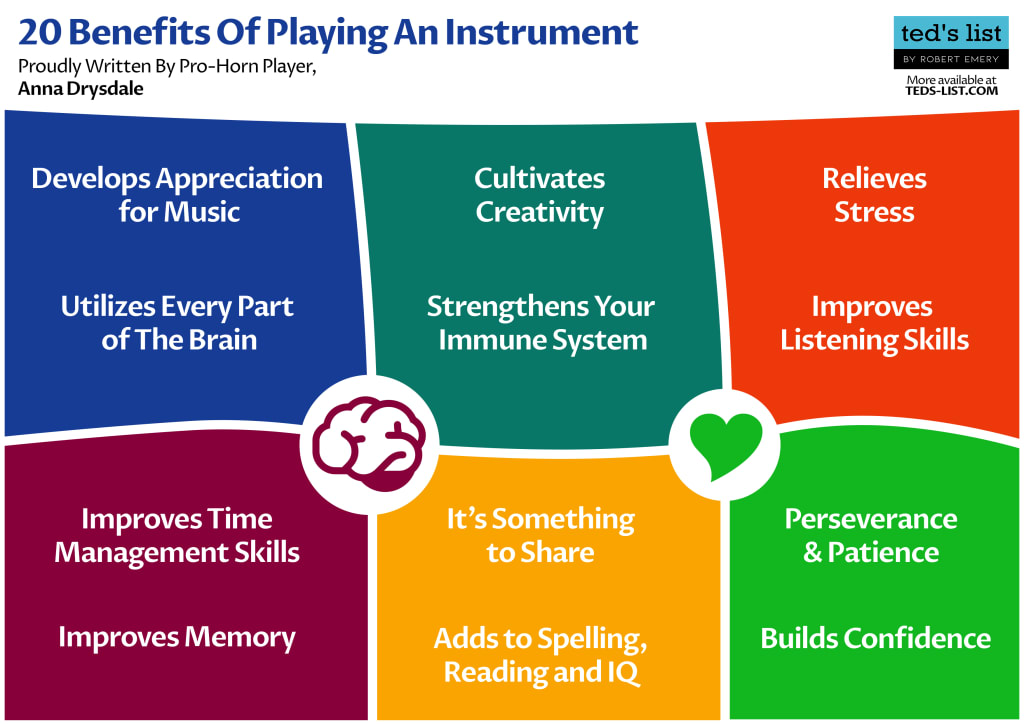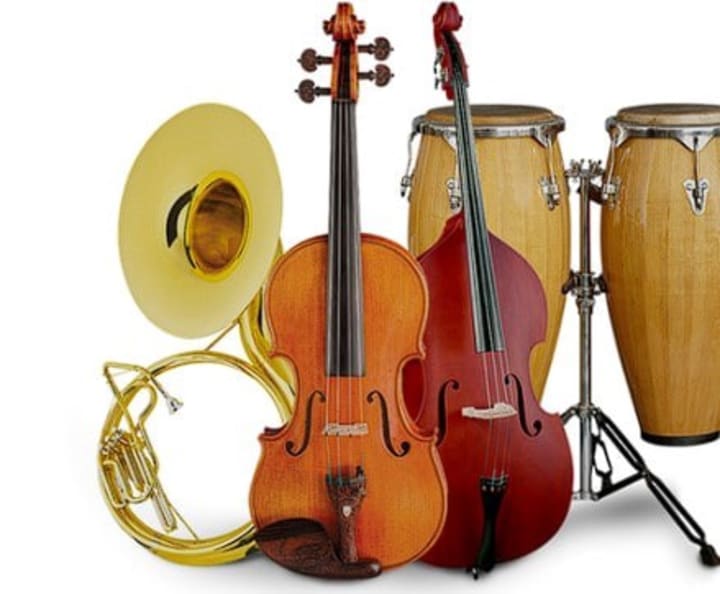20 Benefits of Playing an Instrument
Proudly Written by Pro-horn player, Anna Drysdale for teds-list.com

Playing a musical instrument can be hugely beneficial for anyone, so we like to tell you about the 20 benefits of playing an instrument. Aside from the obvious benefit of gaining a fun life-long skill and a hobby that can take you to far-flung concert halls and destinations, there are numerous other mental, physical, and social advantages. The benefits of music are basically limitless!
Develops appreciation for music
When you play an instrument and have a certain amount of musical ability, it means you can appreciate music from an insider’s perspective. It can be really exciting hearing your instrument being played in an ad or a film, and you’ll probably notice the music more in these things, too.
Cultivates creativity

Music encourages us either to create music or to create moments. If you compose music, you are doing the former. If you are thinking about whether a passage should be big and bold or small and understated, you create an experience. Musicians have the ability to create emotions and beauty, angst, or drama. All of which are creative!
Health benefits of playing an instrument
Relieves stress
To play an instrument is fun and can be really absorbing. It’s the perfect activity to relieve stress.
Practicing or playing in a band or orchestra requires a lot of concentration, which reduces stress by crowding it out and leaves little space for negative thoughts.
Plus, for most amateur musicians, music is a world away from any potential stress in your job.

Strengthens your immune system
This may sound tenuous to you, but it has actually formed the basis of a study.
The study in question showed that listening to music of any kind has real health benefits and can induce relaxation, heighten levels of antibodies, and lower cortisol levels in the body. It’s preliminary research that will require further studies to take place, but it’s certainly promising.
There are worse ways to lower your blood pressure!
Physical benefits of playing an instrument
Utilizes every part of the brain
Numerous studies have shown that learning to play a musical instrument can enhance your verbal memory, develop your spatial reasoning, aid hand-eye coordination & motor skills and improve your literacy. And it uses all those parts of your brain at once!
And often musicians have to remember things — be it instructions from a rehearsal, learning our scales or playing music by heart. We know memory is a skill that can be trained — perhaps musicians are naturally training it all the time.
Improves listening skills
Listening as a musician directly parallels “normal” listening. Playing in an orchestra, you might have to try and fit your part in with another section — and both work together to make sure you’re listening to each other.
Even in your lessons, while learning how to play your instrument, you have to listen carefully to a teacher in a one-to-one situation and try to do what they say.
So while non-musicians may regard listening as a lost art, musicians are listening all the time — a sure-fire way to improve your listening skills.
Improves time-management skills
When you learn to play a musical instrument, you have to fit practice into your daily life. Realising that you can almost always slot 20 minutes of practice into a typical day is a crucial lesson about time management — if you can keep a musical instrument as a habit, what else could you change about your life?
Successful musicians are good at prioritising what’s important, e.g. difficult sections of the music, exposed passages or a particular weakness they need to solve in order to give their best performance.

Gives you something to share with others and improves your social life
One of the best parts of playing a musical instrument is being able to play in a band, orchestra or other ensembles. Many children meet others when playing music together and become lifelong friends.
Mental benefits of playing an instrument
Strengthens perseverance and patience
Playing music is a hugely complex art, perhaps more so than many other things humans do. There’s the physical side, the psychological performance side, the skills you have to learn and the creative side.
There are so many complex details to learn in music that they inevitably take time and effort to develop. While this is happening, the player needs to exercise huge amounts of patience and perseverance.
Learning to fail, get up and try again is a skill that builds a real sense of resilience or “grit” in an individual. When it is framed in the right way, coping with rejection or failure can really build courage.
Increases memory capacity
There have been many studies that have shown music improves memory in some capacity.
A recent study in Chile compared children with a musical education (i.e. taking instrumental lessons) to those without extra-curricular musical training. The “musical children” (who took instrumental lessons) significantly outperformed the non-musicians on memory tasks.
Children who practice an instrument are frequently encouraged to memorise pieces and scales…and often need the discipline to repeat passages in a piece of music as part of their learning over and over again, meaning that the process of making music often involves a lot of learning through repetition.
Some students, such as those educated in the Suzuki method, do a lot of playing by ear, which in the absence of written music requires the use of memory to retain the music instead of reading it.
Benefits spelling, reading and IQ in children
There is a correlation between learning how to play an instrument and higher IQ, one of the studies that explored this was by Glenn Schellenberg at the University of Toronto. 144 first-graders were given one of the following: free keyboard lessons, free voice lessons, free drama lessons or nothing at all.
All groups showed improvement in IQ (natural over the course of a school year), but the music groups showed significantly more than any other group.
The study didn’t go into why they think this happened, but Schellenberg’s working theory was that music puts a lot of emphasis on useful brain skills for general intelligence: memory, concentration, practising a skill, understanding a new “language” etc.
A number of studies in quick succession over the last ten years have found that learning music benefits students in spelling tests, largely because it benefits them in auditory processing, vocabulary, verbal memory…in layman’s terms, anything language-y. Students can visit studycrumb, or similar services, for more practical writing tips and free tools to help them do just that.
So basically, it looks like all of the areas of the brain involved in language are in some way impacted by musical training.
Again, this is one of those links where the reasons for it aren’t fully understood, but there’s a big enough body of evidence to suggest that learning music has huge academic and cognitive benefits for those who study it.
Emotional benefits of playing an instrument
Builds confidence
There are inevitably opportunities to perform in music — and lots of them, at many different levels. Your first performance might be with a choir of 100 children (breaking you in gently).
Over a lifetime of performing, these experiences might build in intensity, from the aforementioned lower-pressure group concerts to orchestral concerts where you have a short solo and all the way up to solo recitals. And every sense of achievement builds confidence. Many young people come out of their shells through playing in public, and low-stakes performing can be a way to start this process.
Some people also grow in confidence because music provides a way for them to express emotions that they would struggle to speak out loud.
Music isn’t just the preserve of limelight-loving extroverts — there are many quiet, introverted people who would rather stand up on stage with an instrument in front of them and play than talk about themselves at length to a group of people.
And music is often used in projects with non-verbal people or refugees who may not speak the languages spoken in their new country of residence — music has become a universal language.
20 Benefits Of Playing An Instrument Summary
The benefits of learning a musical instrument are obvious. It develops lifelong skills — mental agility and resilience, social abilities like listening and making friends, and confidence in oneself in a very natural way.
Learning an instrument is a journey that’s not just about the instrument itself; the benefits are so far-reaching that they really seep into your life in a good way. For many of us, learning an instrument is the best thing that ever happened to us — and it’s huge amounts of fun, whether you end up doing it professionally one day or if you keep it as a hobby.
So if you don’t do it already — go start!
And remember, if you’re not sure what instrument to play, then check out our 10 Tips To Figure Out What Instrument To Play article here.
If you want to see exclusive extra content, like FAQ’s and comments, then come to our website to read the original article!
About the Creator
Ted's List
Do you need advice or reviews on anything related to music or musical instruments? Ted's List is the world's leading community, here to help you. Ted's List is the world's best resource to help you.






Comments
There are no comments for this story
Be the first to respond and start the conversation.